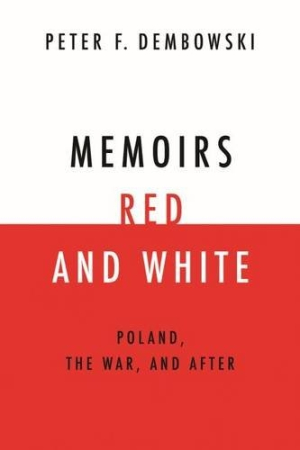Memoirs Red and White
Poland, the War, and After
Glimpses into Dembowski’s experiences and family history reveal the reality of war before, during, and after its events.
Peter F. Dembowski, in his two-pronged memoir, Memoirs Red and White, provides an engrossing glimpse into his early life growing up in Poland prior to World War II and his subsequent immigration to Canada and eventually the United States. The title refers to the bicolored Polish flag, horizontal red and white stripes, and in this memoir the “red” symbolizes Dembowski’s life in Poland prior to the war, while the “white” is his later professional and personal life in Canada and the United States.
In the first section, the prose is engaging, and the use of Polish terms like konspiracja (conspiracy) imbues the story with an immediacy. Much of the information provides glimpses into the precariousness of life before and during the war. This section of the memoir sketches Dembowski’s extensive family history, but one difficulty is the desire to tell all their stories, which crowds the narrative with excessive details: grandparents, aunts, cousins, siblings, and neighbors come and go with alarming rapidity. What keeps the narrative energized is that some of the goings are jolts of the reality of war.
When the story settles down and documents specific incidents, it regains its tension. In the summer of 1943, Dembowski participated in the Polish resistance. He was captured and detained by the Gestapo, and his release was quite unexpected by his family. A year later, Dembowski was again captured and sent to one of the many internment camps outside of Warsaw until it was liberated by the British.
After the war ended, Dembowski immigrated to Canada and began to find himself. While his native language is Polish, he learned French in school and German in the streets. He reads Russian and writes in English. Not surprisingly, his successful professional university life centers around languages. This period of time, from 1946 to the present day, reads primarily like an encyclopedia entry of events: education, marriage, academia, and family, though several of the stories discussing postwar politics, the peace movement, and anticommunism stand out. The final fifteen pages of the memoir cover a span of almost fifty years.
Nevertheless, the success story of a World War II survivor from Poland is enlightening, inspirational, and thoughtful.
Reviewed by
Thomas H. Brennan
Disclosure: This article is not an endorsement, but a review. The publisher of this book provided free copies of the book to have their book reviewed by a professional reviewer. No fee was paid by the publisher for this review. Foreword Reviews only recommends books that we love. Foreword Magazine, Inc. is disclosing this in accordance with the Federal Trade Commission’s 16 CFR, Part 255.

